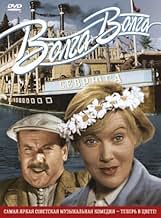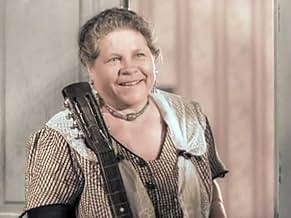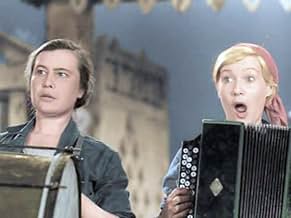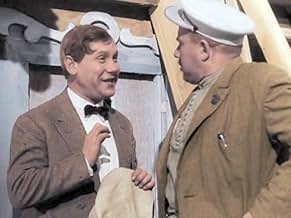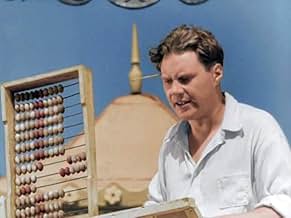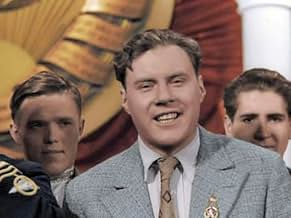Ajouter une intrigue dans votre langueWidely claimed to be Joseph Stalin's favorite movie, this classic musical comedy is a must-see. The action takes place on a steamboat on the iconic Volga River, as two groups of performers t... Tout lireWidely claimed to be Joseph Stalin's favorite movie, this classic musical comedy is a must-see. The action takes place on a steamboat on the iconic Volga River, as two groups of performers travel to Moscow to perform in the Moscow Musical Olympiad.Widely claimed to be Joseph Stalin's favorite movie, this classic musical comedy is a must-see. The action takes place on a steamboat on the iconic Volga River, as two groups of performers travel to Moscow to perform in the Moscow Musical Olympiad.
- Prix
- 1 victoire au total
Anatoli Shalayev
- The Boy Musical Prodigy
- (as Tolya Shalayev)
Mariya Mironova
- The Secretary
- (as M. V. Mironova)
Nikita Kondratyev
- The Waiter
- (as N. S. Kondratyev)
Vsevolod Sanaev
- The Lumberjack
- (as V. V. Sanayev)
Alexei Dolinin
- The Militia Man
- (as A. G. Dolinin)
Ivan Chuvelyov
- The Olympiad Representative
- (as I. P. Chuvelyov)
Nikolai Khryashchikov
- Appearing
- (uncredited)
Yakov Rykov
- Tugboat captain
- (uncredited)
Lidiya Vinogradova
- Amateur Performer
- (uncredited)
Avis en vedette
This 1938 musical comedy from the Soviet Union directed by Grigori Alexandrov has some fame as Stalin's favorite movie. He liked it so much he has it shown in his private screening room at the Kremlin to his Politburo colleagues scores of time. He repeatedly teased Khrushchev for his likeness to Byvalov, the humorless village bureaucrat played by Igor Ilinsky.
The movie opens with an amusing intro in which a catchy song mentions the main cast and the characters they play. Then it moves to a scene showing the two love interests of the film kissing in the mouth (the kiss is far more passionate than what most movies from the West would permit at the time). And then we go to the main story. In a country village along the Volga River, there is a friendly competition between a folk music band (led by the beautiful Lyubov Orlova) and a more conventional classical music outfit, which is led by her boyfriend, Alyosha (played by Andrei Tutyshkin). When in the village they heard there is a musical contest for country bands in Moscow, and despite the initial opposition of the bureaucrat, both bands take the river boat to reach the capital.
Naturally for a musical comedy, the finest thing in the film is the musical numbers. The best in my opinion comes around the middle when virtually all the village gets into playing different tunes to convince the bureaucrat that they have talent worthy of going to the contest in Moscow. The movie oozes nostalgia for the simple village life (in a time when the Soviet Union was rapidly urbanizing) and is also how the Soviet government has made life so much better than now villagers mostly has to worry not about surviving but about playing in music contests. Only towards the end the movie falls into the territory of heavy propaganda. The sympathy of Orlova helps (though sometimes she stretches it too far).
The movie opens with an amusing intro in which a catchy song mentions the main cast and the characters they play. Then it moves to a scene showing the two love interests of the film kissing in the mouth (the kiss is far more passionate than what most movies from the West would permit at the time). And then we go to the main story. In a country village along the Volga River, there is a friendly competition between a folk music band (led by the beautiful Lyubov Orlova) and a more conventional classical music outfit, which is led by her boyfriend, Alyosha (played by Andrei Tutyshkin). When in the village they heard there is a musical contest for country bands in Moscow, and despite the initial opposition of the bureaucrat, both bands take the river boat to reach the capital.
Naturally for a musical comedy, the finest thing in the film is the musical numbers. The best in my opinion comes around the middle when virtually all the village gets into playing different tunes to convince the bureaucrat that they have talent worthy of going to the contest in Moscow. The movie oozes nostalgia for the simple village life (in a time when the Soviet Union was rapidly urbanizing) and is also how the Soviet government has made life so much better than now villagers mostly has to worry not about surviving but about playing in music contests. Only towards the end the movie falls into the territory of heavy propaganda. The sympathy of Orlova helps (though sometimes she stretches it too far).
How often do film reviews of American and British films begin by mentioning such things as Winston Churchill being the 20th century's greatest mass murderer for having killing over 7 million Indians in the Indian Holocaust in Bengal; 1 million Kenyans during the Mau Mau Rebellion, and millions more in other holocausts? As to the US, it has killed more people since WW2 in wars for oil profits than the Nazis could ever have dreamed about in WW2. If you want to talk about torture (Guantanamo), gulags (prisons), and a police state where only the rich have freedom, because they can buy justice, the US should be number one on your list. Yet, while there is no mention of any of these atrocities when American and British films are reviewed. So why is it everyone has to suffer every time they read a review of a Soviet film; reciting ad nauseum supposed atrocities committed by the Soviet Union and Stalin by people who have never been there and have no idea what the reality maybe. Why can't a film review actual begin by criticizing the merits or lack of merits in a film instead?
Is Volga Volga, Soviet film propaganda? Of course, but so is all film. Films cost millions to produce. You need financing. You need distribution. For example, ever wonder why you don't see poverty in American films? Quite simple, American films are self-censored by the Bankers/Financiers. American films are created to be both escapist fantasies for those in this country and to propagate to people abroad: Look capitalism is great-everyone owns their own home, drives a brand new car, and barely works. The American film industry is so successful, I have to fight with people abroad that according to the US Census Bureau figures ½ the US population lives at or near the poverty level. Why am I bringing this up? Because it would be nice if for a change a review of a Soviet film was actually concerned with criticizing the merits of a film rather than spewing rabidly anti-communist just for the sake of it. I hope this will be my contribution to this film review.
Volga, Volga is an exciting Russian musical comedy in the vaudeville tradition of historical interest. Stalin had numerous private screenings at the Kremlin; often teasing Khrushchev of his likeness to Byvalov, the corrupt, boorish, village bureaucrat. He was so was so proud of this film, he presented it to Roosevelt as a gift. Some say it was his favorite film.
Not as well-directed as many US musicals of the time, the film is at times a bit laborious to watch, especially in the beginning; and if you're Russian you won't catch some of the humor. However, these faults are easily overcome by its sheer energy, wit, and enthusiasm.
The film is an escapist fantasy with a politically-charged message. Made at a time when Russia was becoming more urbanized and industrial, the film depicts the charms of rural life. The simple plot seems to revolve around an engaged young couple and a musical competition taking place in Moscow. They break up as each tries to compete for who gets to Moscow first to perform. There is singing, dancing, romance and of course a happy ending.
What makes Volga, Volga a propaganda film? Is the fact, the people are shown to take actions on their own accounts. The main plot, easy to miss, revolves really around Byvalov and the rural community he is supposed to serve. From the beginning, we see a corrupt, self-serving official who only cares about "moving up". Forced to ride on a slow horse, because he refused to invest in any modern vehicles, he also refuses to allow the villagers to participate in the contest, feeling they are too backwarded to be talented. This forces the villagers to take matters into their own hands. As the villagers state at the end of the film: "We are glad you laughed! Opportunists like Byvalov are petty in their thoughts and actions. They obstruct our work: We must clean all the garbage. Sweep it away."
Contrary to popular misconceptions in West, the facts are that Stalin was trying to institute elections after WW2. However, the Comitern (the Soviet parliament) refused to vote for such measures; members like Khrushchev, who by the way hated Stalin and is partially credited for the anti-Stalin lies told about him.
Even those of us with some sort of education in the field of cinema rarely get to see other Soviet films than those of Eisenstein, Tarkovskij and maybe Pudovkin. It´s easy for every western film fan to become as prejudiced as the bureaucrat Byvalov in Volga-Volga: "Talent? in this dump?" My point being, of course, that it would be unfair to world cinema as well as to oneself if one were to deny oneself the pleasures of at least once in a while seeing a Feuillade serial, a German mountain film or a Soviet musical. Volga-Volga is an excellent choice for the curious cinephile. As everyone points out, it has the distinction of reportedly being Stalin´s favourite film, it has stars in it is well as great music, I could go on and on. The main reason for seeing Volga-Volga is of course that it´s great fun. It had me in stitches more than once.
A comment on polart´s vhs edition of Volga-Volga: Granted, the subtitles are yellow and eminently readable, but they are also quite often badly timed and frequently seem insufficient. Also, the framing seems to be slightly off, something i´m hesitant in blaming comrades Alexandrov and Petrov for.
A comment on polart´s vhs edition of Volga-Volga: Granted, the subtitles are yellow and eminently readable, but they are also quite often badly timed and frequently seem insufficient. Also, the framing seems to be slightly off, something i´m hesitant in blaming comrades Alexandrov and Petrov for.
"Volga-Volga", directed by Alexandrov (Eisenstein's cameraman in "Ten Days" and other Soviet classics), is perhaps the best of a series by him that provides a Russian echo of Busby Berkeley's work in the US. Like Berkeley, Alexandrov has been attacked by some at present who see only the escapist side of this type of musical fantasy/comedy. But "Volga-Volga" also barbs "bureaucratic commissars" as did "Golddiggers of 1933" skewer "stuffy aristocrats".
Wonderful music and vaudeville-style entertainment, with Lyubov Orlova heading a talented cast, insured that "Volga-Volga" is perhaps the film most beloved by ordinary Russians ever made in the Soviet Union; it certainly was during the '30s and '40s. That Stalin presented a personal gift copy to Roosevelt during the war probably elicited the approbation "Stalin's Favorite Film". It was clear that he was proud of it, and we were allies. Today one would have to be a pretty unregenerate cold warrior or slavophobe to be offended by "Volga-Volga".
The plot: like with Berkeley, not so important. It involves a running competition (including a boat race down the Volga river) between a folk music band and a more formal village orchestra. There is singing, dancing, romance. And a happy ending.
Now you can judge for yourself. A crystal-clear VHS copy of this (and other Alexandrov '30s musicals) is distributed by Polart with easy-to-read yellow subtitles (I wish all foreign films were so graced).
Wonderful music and vaudeville-style entertainment, with Lyubov Orlova heading a talented cast, insured that "Volga-Volga" is perhaps the film most beloved by ordinary Russians ever made in the Soviet Union; it certainly was during the '30s and '40s. That Stalin presented a personal gift copy to Roosevelt during the war probably elicited the approbation "Stalin's Favorite Film". It was clear that he was proud of it, and we were allies. Today one would have to be a pretty unregenerate cold warrior or slavophobe to be offended by "Volga-Volga".
The plot: like with Berkeley, not so important. It involves a running competition (including a boat race down the Volga river) between a folk music band and a more formal village orchestra. There is singing, dancing, romance. And a happy ending.
Now you can judge for yourself. A crystal-clear VHS copy of this (and other Alexandrov '30s musicals) is distributed by Polart with easy-to-read yellow subtitles (I wish all foreign films were so graced).
A musical comedy. The famous work of the famous director Grigory Alexandrov and the actress Lyubov Orlova, beloved by millions at that time, as well as Comrade Stalin's favorite film, which he often reviewed. And how could you pass by such a thing? So the author of this review could not do this, and looked at the picture with great pleasure. And the final result rather pleased him. And here is a brief opinion - A good Soviet musical comedy of the late thirties. There were almost only advantages in it (with the exception of editing, but the author of this review will tell you about this in a separate paragraph), but for now you should finish the introduction and move on to the interesting.
So, here are the pros: 1. The scenario - the picture tells the story of two amateur musical groups that go to Moscow to participate in the Olympics, and the leaders of these groups: Avdotya Petrova, nicknamed "Strelka" and Alexey Trubyshkin are lovers, which gives everything that is happening a whisper of piquancy. At the same time, the local bureaucrat Byvalov takes part in all this activity, who wants to "push himself" at the expense of talented people. The old pilot fits well into this company. There are many different situations waiting for them on the way, and in the final there will be a grand triumph. In addition, the creators even destroy the "fourth wall", which looks pretty good. In addition to the fact that the script here is easy, it also charges every viewer who looks at the picture with a great mood. It's worth a lot.
2. Humor - there are frankly funny moments, and a lot of funny situations, and outright antics of some actors (in most cases it works correctly). Of course, wild laughter is not worth hoping for, although there is one point that strongly leads to this. The humor here is more mundane, and that's what catches on.
3. Songs and music - this picture can now be called a musical with full rights, since they sing and dance quite often here - and it turned out just great. The precision of the movements, and this despite the fact that some of the artists were already far from young. And the songs are pleasing to the eye and ear. Although there is not a single one that sticks in the memory (except classical music, which everyone knows). Although their text was written by Vasily Lebedev-Kumach.
4. The life of the USSR in the thirties - we will be shown the Volga-Don Canal, which was one of the great buildings of communism, musical competitions, and not only. They will show us how life itself is changing, how the achievements of the Soviet government made the dreams of ordinary people a reality. And although the scenario line with Byvalov is reduced to humor, it reflects reality (which is still relevant).
Now it should be said about an important point that somewhat spoils the overall impression, namely the crooked installation, and the author of this review watched the color version of the painting, which was castrated in the fifties of the last century, and the original of 1938 has not been preserved (thank you tell the Cornhusker for this), so we cannot enjoy the original version. And it's lucky that they didn't paint the fully castrated version, because there is a black-and-white version from 1961, from where all mentions of Stalin, his images and busts were cut out. The installation was done very poorly and the glues are visible (this is written by a person who has been engaged in installation for a long time).
Separately, the author of this review wants to thank the artists Igor Ilyisky (bureaucrat Byvalov), Lyubov Orlova, Andrei Tutyshkin, Vladimir Volodin (old pilot), and all the others for the talented performance of their roles in this musical comedy. Now their acting will seem too "pompous" to many, but they tried anyway, and it's not for nothing that the picture has gained well-deserved popularity, and it's not for nothing that it has gained cult status in the country. You need to know the classics!
A score of 8 out of 10 and a recommendation to watch!
So, here are the pros: 1. The scenario - the picture tells the story of two amateur musical groups that go to Moscow to participate in the Olympics, and the leaders of these groups: Avdotya Petrova, nicknamed "Strelka" and Alexey Trubyshkin are lovers, which gives everything that is happening a whisper of piquancy. At the same time, the local bureaucrat Byvalov takes part in all this activity, who wants to "push himself" at the expense of talented people. The old pilot fits well into this company. There are many different situations waiting for them on the way, and in the final there will be a grand triumph. In addition, the creators even destroy the "fourth wall", which looks pretty good. In addition to the fact that the script here is easy, it also charges every viewer who looks at the picture with a great mood. It's worth a lot.
2. Humor - there are frankly funny moments, and a lot of funny situations, and outright antics of some actors (in most cases it works correctly). Of course, wild laughter is not worth hoping for, although there is one point that strongly leads to this. The humor here is more mundane, and that's what catches on.
3. Songs and music - this picture can now be called a musical with full rights, since they sing and dance quite often here - and it turned out just great. The precision of the movements, and this despite the fact that some of the artists were already far from young. And the songs are pleasing to the eye and ear. Although there is not a single one that sticks in the memory (except classical music, which everyone knows). Although their text was written by Vasily Lebedev-Kumach.
4. The life of the USSR in the thirties - we will be shown the Volga-Don Canal, which was one of the great buildings of communism, musical competitions, and not only. They will show us how life itself is changing, how the achievements of the Soviet government made the dreams of ordinary people a reality. And although the scenario line with Byvalov is reduced to humor, it reflects reality (which is still relevant).
Now it should be said about an important point that somewhat spoils the overall impression, namely the crooked installation, and the author of this review watched the color version of the painting, which was castrated in the fifties of the last century, and the original of 1938 has not been preserved (thank you tell the Cornhusker for this), so we cannot enjoy the original version. And it's lucky that they didn't paint the fully castrated version, because there is a black-and-white version from 1961, from where all mentions of Stalin, his images and busts were cut out. The installation was done very poorly and the glues are visible (this is written by a person who has been engaged in installation for a long time).
Separately, the author of this review wants to thank the artists Igor Ilyisky (bureaucrat Byvalov), Lyubov Orlova, Andrei Tutyshkin, Vladimir Volodin (old pilot), and all the others for the talented performance of their roles in this musical comedy. Now their acting will seem too "pompous" to many, but they tried anyway, and it's not for nothing that the picture has gained well-deserved popularity, and it's not for nothing that it has gained cult status in the country. You need to know the classics!
A score of 8 out of 10 and a recommendation to watch!
Le saviez-vous
- AnecdotesFamously, this was Joseph Stalin's favorite film and he would often show off how well he knew it by performing every part just before the actors on screen.
- ConnexionsFeatured in Komediya davno minuvshikh dney (1980)
Meilleurs choix
Connectez-vous pour évaluer et surveiller les recommandations personnalisées
Détails
- Durée1 heure 44 minutes
- Couleur
- Mixage
- Rapport de forme
- 1.37 : 1
Contribuer à cette page
Suggérer une modification ou ajouter du contenu manquant


